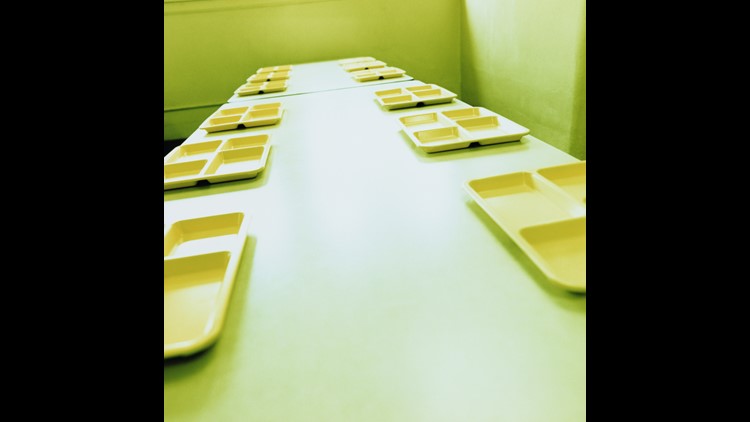HARTFORD, Conn. (AP) -- Dropped onto Connecticut inmates' food trays in recent days was a concoction called chilitos, consisting of a cup of meatless chili mix, one slice of cheese, brown rice, refried beans and two tortillas, along with a half-cup of pudding and an 8-ounce drink.
Not bad for a jailhouse lunch, maybe. But lean ground beef, whole pieces of chicken and extra fresh fruit and vegetables could soon be on the menu under a budget proposal from Democratic Gov. Dannel P. Malloy that bucks a national trend toward spending less, not more, on inmate nutrition.
His administration argues that throwing a little more money at prison meals will save a lot more down the line by making inmates, many of whom rely on state-funded health care after their release, more healthy inside prison and out. Malloy takes credit for coming up with the idea himself, arguing it's part of a continuing effort to provide inmates with the life skills they need to re-enter society.
Also, it's seen as a way to help keep the peace in the prisons.
"You have to remember that if you are not being fed, you're going to be angry. And that anger can turn into violence," said Ed Calderon, 42, who has been out of prison for 13 years. Calderon, who now works with at-risk youth in Bridgeport, Connecticut's largest city, still remembers watered-down oatmeal, powdered mashed potatoes and the fights that broke out between grown men frustrated by small portions.
"If the portions are not sufficient, then those inmates who are bigger and stronger, and I guess more violent, will take the food from other inmates in order to get enough food," he said.
Malloy's plan would boost the typical daily food budget for each inmate 10 percent, from $2.95 to $3.25. The state would still lag behind some neighbors; Rhode Island spends $4.40 per inmate per day, Massachusetts $4.16 and Maine $3.75. New York spends $2.85, according to Malloy's office.
"In addition to being the right thing to do, this is a common-sense policy change that will save taxpayer money in the long run by promoting a healthy lifestyle and ultimately reducing medical costs," said Leigh Appleby, a spokesman for the governor.
To become reality, Malloy's plan must become part of a final budget agreement between the governor and legislators. Lawmakers hope to have a deal before this year's session ends May 9, but it remains unclear whether that will happen. Malloy's fellow Democrats already reduced the governor's proposal by half in their budget plan, and the General Assembly's Republicans scrapped the concept entirely in their budget proposal.
Rep. Melissa Ziobron, the top House Republican on the legislature's budget-writing committee, wonders why the state would spend more during tight times to make inmate meals healthier when there is still a long list of foods loaded with sugar, salt and fat available for sale in prison commissaries. She also questioned Malloy's assumption that health care costs will decline because of the investment, saying the administration "can't have it both ways" by asking taxpayers to spend more to make inmate meals healthier when prisoners can "go buy a Suzy Q" cake at the commissary.
"How could I justify that expense?" Ziobron said.
Enfield prison inmate Garrett Bostick, 33, confirmed that a lot of his fellow prisoners eat from the commissary, spending their money on things like ramen noodles.
"I know people who never go to breakfast, lunch or dinner," Bostick said.
It's unusual for a state to consider spending more money, not less, on inmate nutrition, said David Fathi, director of the American Civil Liberties Union's National Prison Project.
With many states now relying on private food service companies in hopes of saving money, inmates have sometimes sued, alleging they are not being fed enough or are being served bad food. Nearly 40 inmates went on a hunger strike at a Texas prison last year, partly to protest what they said were small food portions. And nearly two dozen inmates in the jail system in Arizona's most populous county also went on a hunger strike last year, seeking better and more food; the sheriff said at the time the two daily meals met a court order for nutritional value and exceeded the recommended calorie count.
Jails and prisons in states like Delaware and Virginia have served baked nutritional loaves, typically to unruly inmates, but the practice has been on the decline after years of lawsuits.
Michael Bibens, director of food services at the Connecticut Department of Correction, has made an effort to include more healthy ingredients and regularly surveys inmates about the meals in the state's prisons. He ignores the requests for steak and lobster but has scrapped the unpopular soups and stews that were precooked at one facility and shipped to the other prisons.
"It's a partnership," he said. "It makes no sense if they're dumping the food in the garbage."



